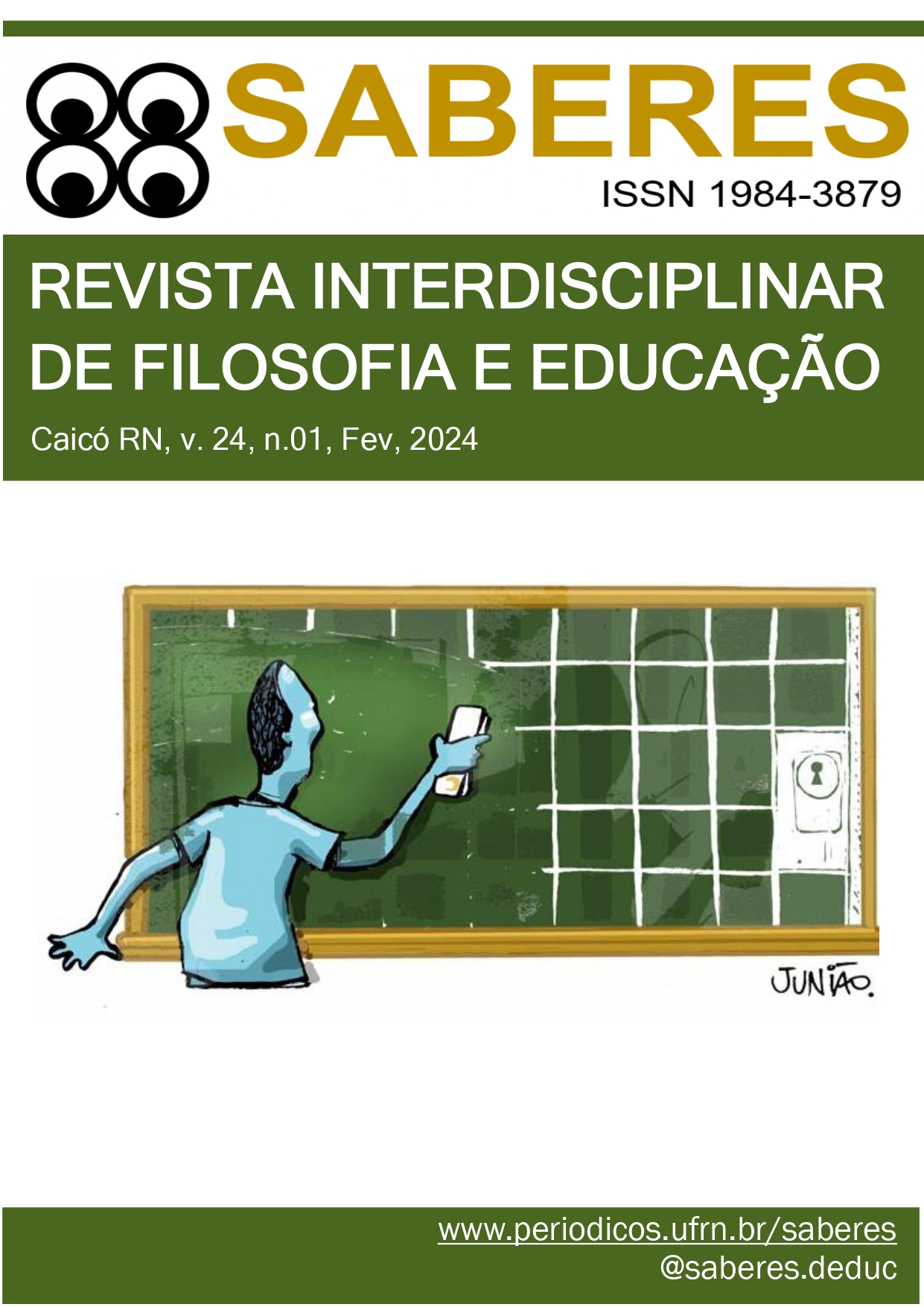RELATIONSHIP INTESTINE AND CENTRAL NERVOUS SYSTEM: THE IMPORTANCE OF THE INTESTINAL MICROBIOME
A IMPORTÂNCIA DO MICROBIOMA INTESTINAL
DOI:
https://doi.org/10.21680/1984-3879.2024v24n1ID33359Keywords:
Distúrbios neuropsiquiátricos, Eixo cérebro-intestino, Distúrbios neurodegenerativos.Abstract
The intestine is very important in the food digestion and in its extension there are several species of microorganisms that belongs to the intestinal microbiome. The research aimed to determine the importance that food and the intestinal microbiome employs on the nervous system. A qualitative and retrospective bibliographical review was carried out, using scientific articles and books published in the databases: Google academic, Scientific Electronic Library Online (SciELO) Minha Biblioteca and Biblioteca Virtual em Saúde (BVS). Based on the bibliographic review, the predominance of the Bacteroidetes and Firmicutes phyla in the microbiome was noted, which are directly or indirectly responsible for the production of anti-inflammatory and pro-inflammatory responses; and that certain bacteria of these phyla are responsible for the production of some of the main neurotransmitters of the central nervous system. Based on the studies presented, we can report that the imbalance in the brain-intestine axis can lead to several disorders such as: obesity, Alzheimer's, anxiety and depression.
Downloads
References
BEZERRA, Ilana Nogueira et al. Consumo de alimentos fora do domicílio no Brasil. Revista de Saúde Pública, Rio de Janeiro, v. 47, n. 1, p. 200-211, fev. 2013. Disponível em: https://doi.org/10.1590/S0034-89102013000700006. Acesso em: 25 abr. 2023.
CONSÓRCIO DO PROJETO MICROBIOMA HUMANO (THE HUMAN MICROBIOME PROJECT CONSORTIUM). Structure, function and diversity of the healthy human microbiome. Nature, v. 486, n. 7402, p. 207-214, jun. 2012. Disponível em: http://dx.doi.org/10.1038/nature11234. Acesso em: 24 abr. 2023.
CUNHA, Andréa Mendonça Gusmão et al. Manual de farmácia 1: farmacologia. 2ª edição. ed. Salvador / Ba: Sanar Saúde, 2020. 268 p.
DINAN, Timothy G. et al. Collective unconscious: how gut microbes shape human behavior. Journal Of Psychiatric Research, v. 63, p. 1-9, abr. 2015. Disponível em: https://doi.org/10.1016/j.jpsychires.2015.02.021. Acesso em: 24 abr. 2023.
DURÇO, Guilherme Moreira; MAYNARD, Dayanne da Costa. OBESIDADE, FIRMICUTES E BACTEROIDETES: uma revisão da literatura. 2018. 17 f. TCC (Graduação) - Curso de Nutrição, Centro Universitário de Brasília – Uniceub, Brasília - Df, 2018. Disponível em: https://repositorio.uniceub.br/jspui/handle/prefix/13278. Acesso em: 24 abr. 2023.
MYLES, Ian A.. Fast food fever: reviewing the impacts of the western diet on immunity. Nutrition Journal, v. 13, n. 1, p. 1-17, 17 jun. 2014. Disponível em: https://doi.org/10.1186/1475-2891-13-61. Acesso em: 25 abr. 2023.
MORAES, Ana Carolina Franco de et al. Microbiota intestinal e risco cardiometabólico: mecanismos e modulação dietética. Arquivos Brasileiros de Endocrinologia & Metabologia, v. 58, n. 4, p. 317-327, jun. 2014. Disponível em: https://doi.org/10.1590/0004-2730000002940. Acesso em: 24 abr. 2023.
RIBEIRO, Izabela Martina Ramos; ANTUNES, Vagner Roberto. Vias Integrativas do Sistema Nervoso Autônomo no Controle do Trato Gastrointestinal. Sistema Digestório: Integração Básico-Clínica, São Paulo, p. 671-682, nov. 2016. Disponível em: http://dx.doi.org/10.5151/9788580391893-24. Acesso em: 25 abr. 2023.
SEZINI, Angela Maria; GIL, Carolina Swinwerd Guimarães do Coutto. Nutrientes e Depressão. Vita Et Sanitas, Trindade-Go, v. 8, n. 1, p. 39-57, 2014. Disponível em: http://fug.edu.br/revistas/index.php/VitaetSanitas/article/view/29/21. Acesso em: 25 abr. 2023.
SILBERNAGL, Stefan; LANG, Florian. Fisiopatologia. 2. ed. Porto Alegre: Artmed, 2016. 433 p. Disponível em: https://integrada.minhabiblioteca.com.br/#/books/9788536325996. Acesso em: 25 abr. 2023.
ZHU, Sibo et al. The progress of gut microbiome research related to brain disorders. Journal Of Neuroinflammation, v. 17, n. 25, p. 1-20, 17 jan. 2020. Disponível em: https://doi.org/10.1186/s12974-020-1705-z. Acesso em: 23 abr. 2023.
Downloads
Published
How to Cite
Issue
Section
License
Copyright (c) 2024 Saberes: Interdisciplinary Journal of Philosophy and Education

This work is licensed under a Creative Commons Attribution-NonCommercial-ShareAlike 4.0 International License.
Este obra está licenciado com uma Licença Creative Commons Atribuição 4.0 Internacional.
Autores que publicam nesta revista concordam com os seguintes termos:
a. Autores mantém os direitos autorais e concedem à revista o direito de primeira publicação, com o trabalho simultaneamente licenciado sob a Licença Creative Commons Attribution 4.0 que permite o compartilhamento do trabalho com reconhecimento da autoria e publicação inicial nesta revista.
b. Autores têm autorização para assumir contratos adicionais separadamente, para distribuição não-exclusiva da versão do trabalho publicada nesta revista (ex.: publicar em repositório institucional ou como capítulo de livro), com reconhecimento de autoria e publicação inicial nesta revista.
c. Autores têm permissão para publicar e distribuir seu trabalho online (ex.: em repositórios institucionais ou na sua página pessoal) após a publicação inicial nesta revista, já que isso pode gerar alterações produtivas, bem como aumentar o impacto e a citação do trabalho publicado (Veja O Efeito do Acesso Livre).
Foram feitos todos os esforços para identificar e creditar os detentores de direitos sobre as imagens publicadas. Se tem direitos sobre alguma destas imagens e não foi corretamente identificado, por favor, entre em contato com a revista Saberes e publicaremos a correção num dos próximos números.


 English
English Español (España)
Español (España) Português (Brasil)
Português (Brasil)



